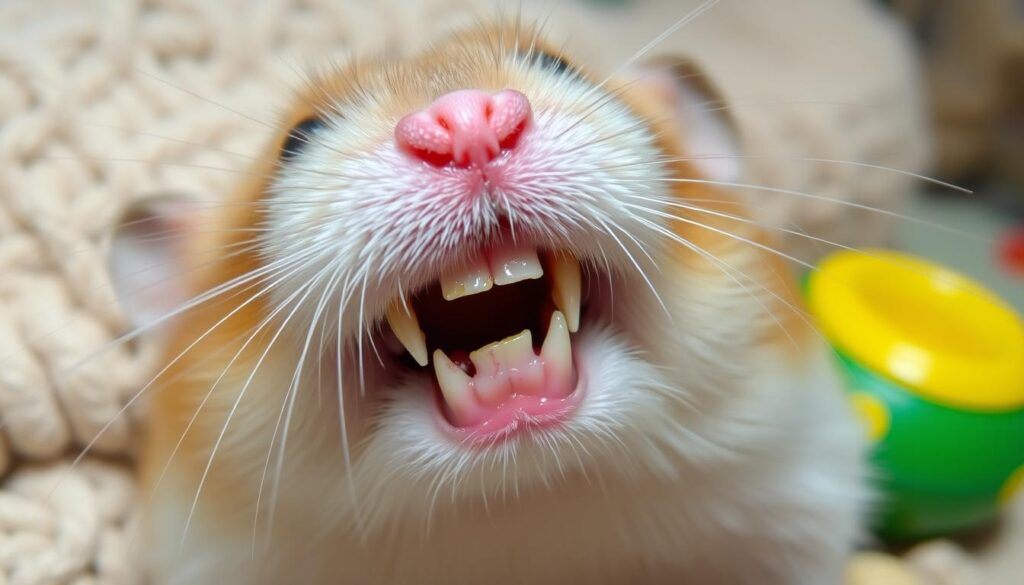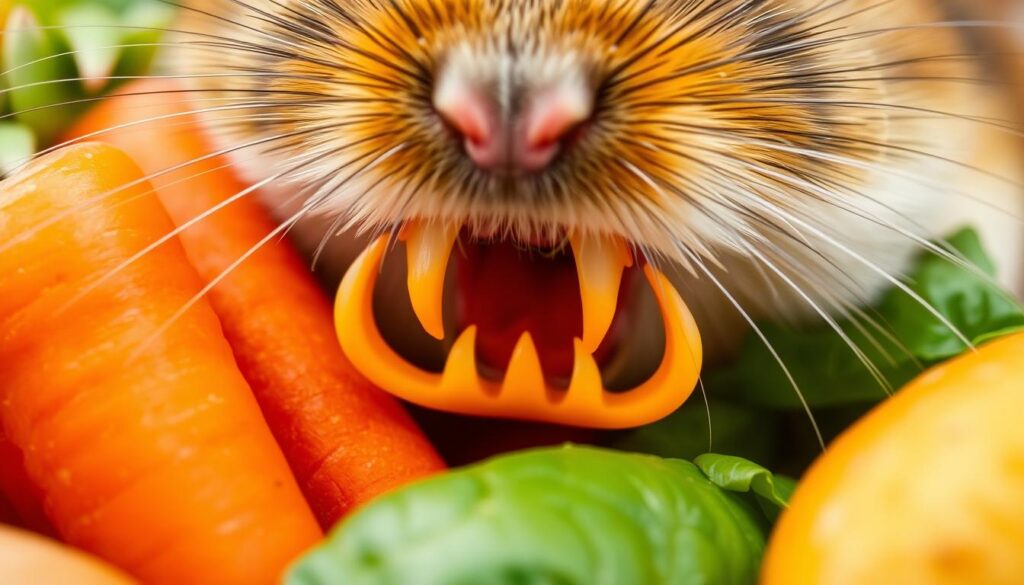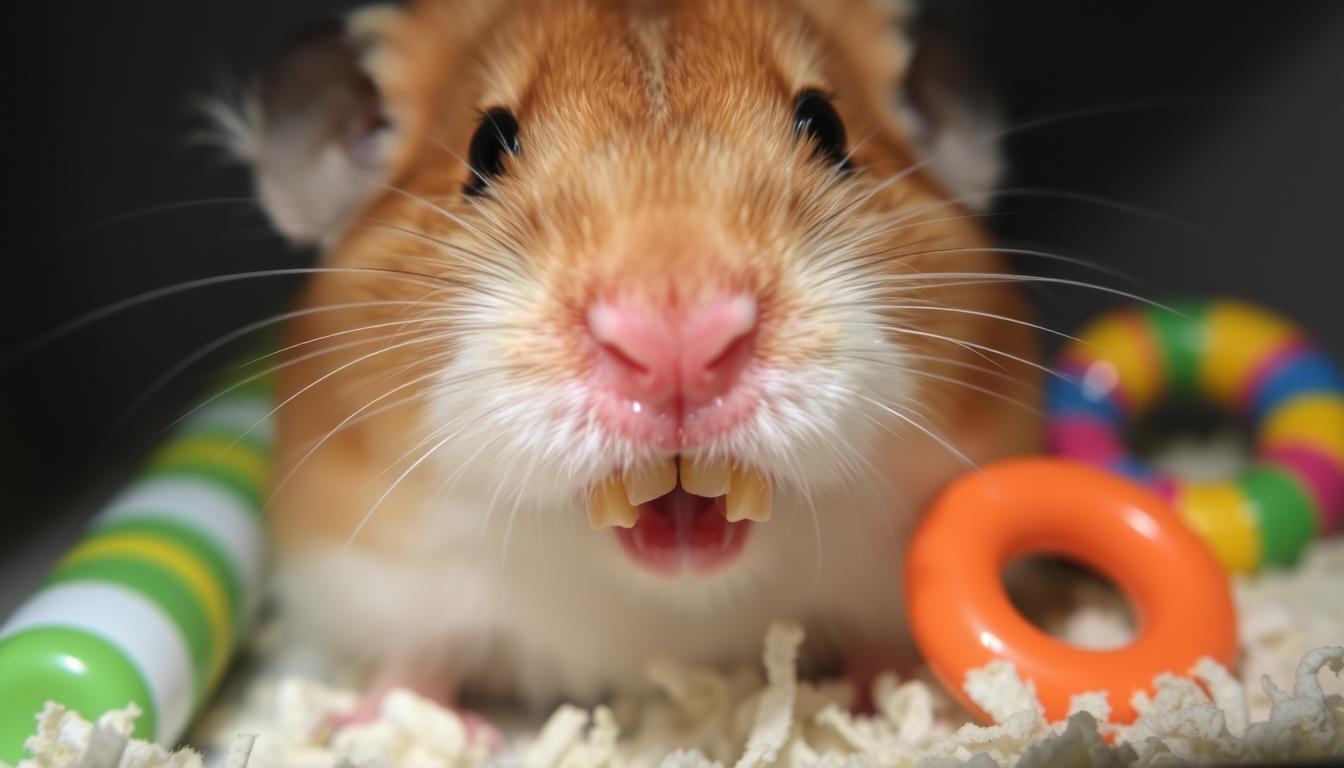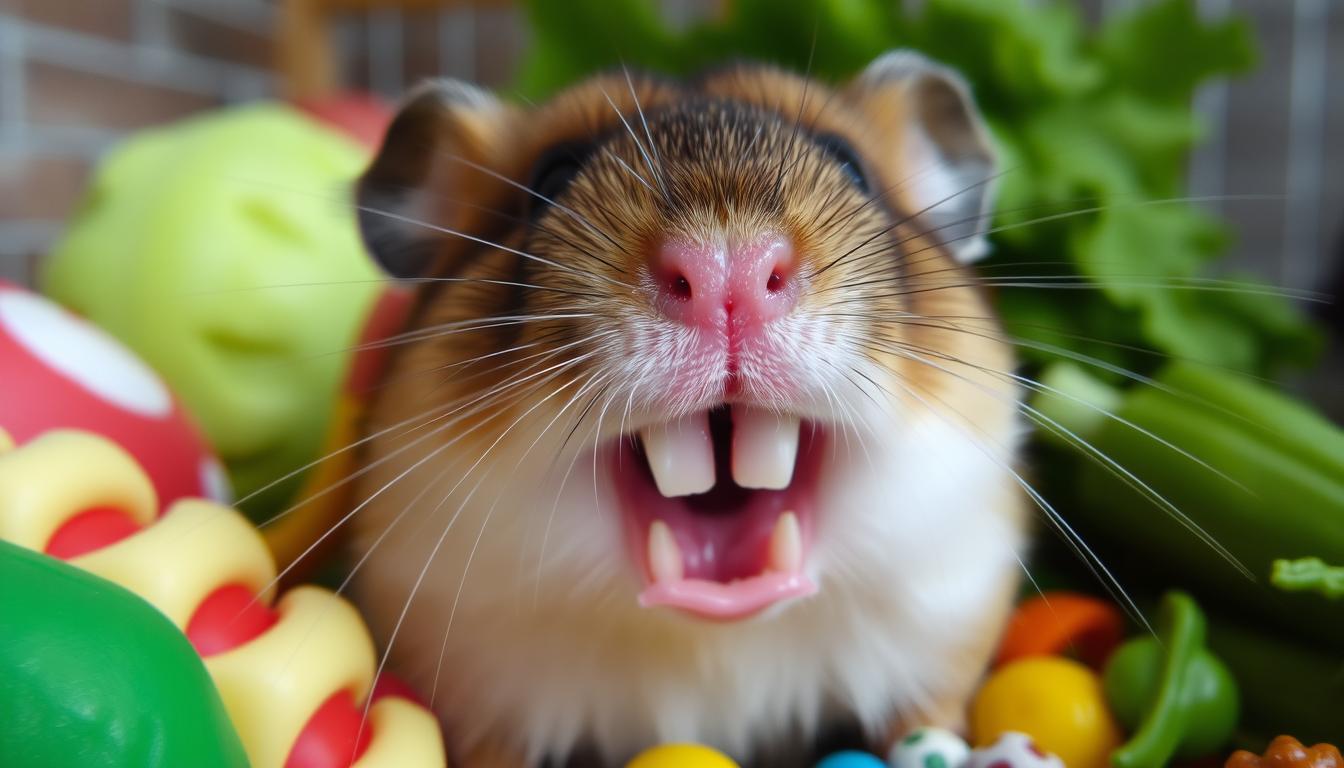Do you know that taking care of your hamster’s teeth is as important as your own? Hamsters need their teeth for chewing and eating. They also help keep your pet healthy. If you ignore your hamster’s dental health, it can lead to serious problems.
In this guide, we’ll show you why hamster dental care is key. We’ll teach you how to keep your pet’s teeth in top shape.
Key Takeaways
- Hamsters’ teeth are constantly growing and require regular maintenance to prevent overgrowth and potential health issues.
- Proper dental care, including a balanced diet and chew toys, is crucial for maintaining your hamster’s dental health.
- Recognizing the signs of dental problems, such as changes in eating habits or physical symptoms, can help you address issues early on.
- Investing in your hamster’s dental health can prevent costly veterinary treatments and ensure your furry friend’s long-term well-being.
- Understanding the anatomy and function of hamster teeth can help you better understand their unique dental needs.
Are you sure you’re giving your hamster the best dental care? Learn how to keep your pet’s smile bright and healthy in this essential guide.
Understanding the Importance of Proper Hamster Dental Care
As pet owners, we must know how vital teeth are for hamsters. Their teeth grow constantly, helping them chew and grind food. Keeping their teeth healthy is key to their overall health.
The Role of Teeth in a Hamster’s Life
Hamsters’ teeth are crucial for several reasons. They use their sharp incisors to gnaw on wood and hay, keeping their teeth in check. Their molars help grind food, making sure they get all the nutrients they need. Healthy teeth are essential for eating, grooming, and defending themselves.
Common Dental Problems in Hamsters
Hamsters can suffer from dental issues like teeth grinding in hamsters, calcium deficiency in hamsters, and tooth problems in pets. Malocclusion makes eating hard and causes discomfort. Incisor overgrowth is painful and can lead to more serious problems. Tooth grinding might signal deeper dental issues.
| Dental Issue | Symptoms | Potential Causes |
|---|---|---|
| Malocclusion | Difficulty eating, misaligned teeth | Genetic factors, trauma, or improper diet |
| Incisor Overgrowth | Overly long front teeth, pain while eating | Lack of chewing materials, calcium deficiency |
| Tooth Grinding | Excessive grinding noises, discomfort | Stress, dental pain, or improper diet |
Understanding the importance of dental care for hamsters helps us prevent common problems. By recognizing these issues, we can ensure our pets stay healthy and happy.
Anatomy of Hamster Teeth
To care for your hamster’s teeth, knowing their unique anatomy is key. Hamsters have special teeth for chewing and grinding food.
Hamsters have 16 teeth, split into incisors and molars. The incisors at the front are long and sharp for gnawing. They grow continuously, helping hamsters chew on wood and hay.
Behind the incisors, there’s a diastema gap. This gap helps move food to the molars in the back. The molars grind food into smaller pieces for digestion.
Hamster teeth grow differently than human teeth. They keep growing their whole lives. This is vital for chewing hard foods that wear down their teeth.
Knowing about hamster teeth is key for their dental care. It helps keep them healthy and happy.
Recognizing Signs of Dental Issues
As a pet owner, it’s important to watch for signs of dental problems in your hamster. Catching these early can help a lot. It ensures your pet stays healthy and happy.
Physical Symptoms of Tooth Problems
Look closely at your hamster’s teeth for any odd colors, growths, or wear. If they drool a lot, have trouble eating, or don’t want to eat hard foods, it might be a sign of dental trouble. If you see anything odd, talk to a vet who knows about small animals.
Behavioral Changes to Watch For
- Decreased appetite or a refusal to eat
- Sudden weight loss or loss of body condition
- Excessive grooming or pawing at the face
- Lethargy or a general lack of energy
- Changes in overall activity levels or playfulness
Knowing the signs of teeth trimming and tooth problems in pets helps you act fast. This way, you can keep your hamster healthy and happy.

“Early detection and intervention are key to managing dental problems in hamsters. Regular check-ups with a veterinarian can help prevent and address any issues before they become more severe.”
Your hamster’s dental health is as vital as their overall health. By being alert and getting help when needed, you can make sure your pet lives a joyful and healthy life.
Providing a Healthy Diet for Optimal Dental Health
Keeping your hamster’s teeth healthy is more than just giving them chew toys. A diet full of nutrients is key for strong teeth. Calcium and vitamins are especially important for this.
Essential Nutrients for Strong Teeth
Calcium is crucial for your hamster’s teeth and bones. Without enough calcium, they might get calcium deficiency in hamsters. This can weaken their rodent teeth and increase dental problems. Give them foods high in calcium like leafy greens, broccoli, and good hamster food.
Vitamins A, C, and D are also vital for dental health. They help keep your hamster’s gums and teeth healthy. Make sure their diet includes fresh fruits and veggies for these vitamins.
“A balanced diet rich in key nutrients is the foundation of your hamster’s dental well-being.”
By focusing on your hamster’s diet and giving them a nutritious mix of foods, you can keep their teeth healthy. This helps avoid calcium deficiency in hamsters and rodent teeth issues.

Maintaining Proper Tooth Length with Chew Toys
It’s key to keep your hamster’s teeth the right length for their comfort and health. Hamsters’ teeth grow all the time. Without the right chew toys, their teeth can grow too long, causing pain and serious dental problems.
Safe and Effective Chew Toy Options
Offering a variety of safe chew toys is vital. These toys help wear down their teeth and satisfy their natural urge to chew. They also keep your hamster happy and mentally sharp.
- Untreated and uncolored wooden blocks or sticks: These natural materials are perfect for hamsters to sink their teeth into and keep their teeth trimmed.
- Cardboard boxes and tubes: Hamsters love to chew on these versatile items, which can be easily replaced when worn down.
- Chew toys for hamsters: Look for specifically designed chew toys made from safe, non-toxic materials that are durable and appealing to your furry friend.
- Timothy hay: Hay not only provides essential fiber for your hamster’s diet but also helps grind down their teeth as they chew on it.
By offering a range of chew toys for hamsters, you can help keep your pet’s teeth in check. This prevents teeth trimming issues and keeps them comfortable and healthy.
Hamster Teeth
As pet owners, it’s key to know about your hamster’s teeth. Their teeth grow continuously, which can be a problem if not taken care of.
Hamsters can get malocclusion, where their teeth don’t line up right. This can cause incisor overgrowth, making it hard for them to eat and groom.
To fix these problems, give your hamster a balanced diet and chew toys. Hay and other fibrous foods help wear down their teeth. Chew toys keep their teeth the right length.
Importance of Monitoring Dental Health
Check your hamster’s teeth often and watch their behavior. Look for signs like:
- Excessive drooling or trouble eating
- Unusual tooth grinding or clicking sounds
- Discolored or overgrown incisors
If you see these signs, see a vet who knows about exotic pets. They can help your hamster get the right care.
Maintaining Healthy Teeth
Give your hamster a balanced diet and the right chew toys. Also, keep an eye on their dental health. This keeps their teeth healthy, improving their life and preventing health problems.
| Dental Issue | Symptoms | Potential Causes |
|---|---|---|
| Malocclusion | Difficulty eating, overgrown incisors | Genetic predisposition, improper diet |
| Incisor Overgrowth | Painful, discolored teeth, drooling | Lack of chewing, improper diet |
Understanding your hamster’s teeth and taking care of them is important. It helps your furry friend live a happy and healthy life.
Conclusion
In this guide, we’ve covered why hamster dental care is crucial. We’ve shown you how to keep your hamster’s smile healthy and happy. You now know how to take care of your pet’s rodent teeth.
Feeding a balanced diet and giving chew toys are important. Also, watch for any changes in your hamster’s mouth. By doing these things, you can prevent dental pain and improve your pet’s life.
Looking after your hamster’s teeth is a big part of being a good pet owner. With the right knowledge and care, your hamster can have a bright, healthy smile for many years.
FAQ
What are the most common dental problems in hamsters?
Hamsters often face dental issues like malocclusion, incisor overgrowth, and tooth grinding. These problems can cause pain, eating troubles, and health issues if not treated.
How can I tell if my hamster has a dental problem?
Look for signs like discolored or long teeth, too much drooling, and changes in eating or behavior. Regular checks and vet visits are key if you see these signs.
What kind of diet is best for maintaining healthy hamster teeth?
A diet full of calcium and vitamins is vital for hamster dental health. Offer high-quality hamster food, fresh fruits, veggies, and chew toys to keep their teeth in check.
How often should I trim my hamster’s teeth?
Trimming hamster teeth is needed to stop overgrowth and keep them aligned. The trimming schedule varies by hamster. Always check with your vet for the best timing.
What are some safe and effective chew toys for hamsters?
Choose chew toys that are safe and right for your hamster. Options include wooden toys, hay cubes, and hamster chew toys designed for gnawing.
How can I ensure my hamster gets enough calcium for strong teeth?
Calcium is key for strong hamster teeth. Feed a balanced hamster food, add calcium-rich treats, and use calcium-enriched water to meet their needs.


